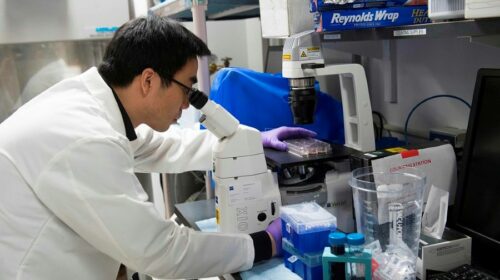Following Rough Year, Is Burning Rock Set to Turn the Corner?

Cancer testing specialist expects sharply slower growth this year than previous guidance due to Covid-related travel restrictions
Key Takeaways:
- Burning Rock expects fourth-quarter revenue to grow just 6% year-on-year due to latest Covid-related travel restrictions in China
- Cancer testing specialist’s newer in-hospital lab business could boost growth through its strong scalability potential and lower vulnerability to Covid travel restrictions
By Doug Young
If it were a hospital patient, cancer testing specialist Burning Rock Biotech Ltd. (BNR.US) might be best described as in “stable condition.”
That seems to be the key takeaway from this company’s latest financial results, which sparked a 10.7% rally for its New York-listed shares. Burning Rock provides cancer testing kits and related services through its own centrally-run labs and increasingly through labs it is setting up within partner hospitals.
The central labs part of the business – which accounts for about two-thirds of its revenue – has struggled during the pandemic as China imposes frequent travel restrictions that prevent people from visiting those facilities during Covid-19 flare-ups. The latest such flare-up began in October and continues to this day, dealing a big blow to the company’s fourth-quarter outlook.
But the bigger picture for this company is that its situation appears to be stabilizing, thanks to its shift to in-hospital testing centers that are less vulnerable to travel restrictions and which offer a business model that’s more flexible and has higher growth potential. We’ll review some of the highlights from Burning Rock’s third-quarter report that reflect these various points shortly.
Then there’s the question of valuation, which perhaps explains the rally for the company’s shares after the latest results came out.
Burning Rock’s shares have been quite volatile since its IPO in June last year. From their listing price of $16.50, they climbed to a high of nearly $40 in May on big hopes for its cancer-detection services and expansion of its in-hospital testing model mentioned above. It’s been pretty much all downhill since then, with the shares sinking below their IPO price in October.
They’ve rebounded modestly since then, and are now up nearly 25% from their all-time low. But at their latest close of $15.22 the stock is still below its IPO price.
Investors seem to be encouraged by the company’s stabilizing situation, and perhaps are also looking at its current valuation that looks relatively low compared to global cancer testing peers. Burning Rock’s price-to-book ratio (P/B) now stands at 4.5, which is just half the P/B of 9 for much larger peer Roche (RO.SW). Smaller peers Thermo Fisher Scientific (TMO.US) and Illumina (ILMN.US) also trade at higher P/B ratios of 6.5 and 5.7, respectively.
Four analysts polled by Yahoo Finance also see the stock as quite undervalued. Three rate it a “buy,” with the fourth rating it a “strong buy.” Equally significant, their average price target of $31 is roughly double the current level. While analyst almost always set their price targets above current levels, it’s relatively rare to see such a big gap, indicating they believe the shares are oversold at their current level.
One possible reason for lingering concerns came in the company’s new guidance in the latest report issued after markets closed on Monday. Burning Rock forecast revenue of about 500 million yuan ($78 million) for all of 2021, which is down sharply from the 610 million yuan given at the start of the year. It blamed the above-mentioned travel restrictions for the big shortfall, which would translate to fourth-quarter revenue of about 140 million yuan.
While the company previously believed the fourth quarter would be far stronger than this latest guidance, it’s worth noting the new forecast still represents modest 6% growth from its 132 million yuan in revenue during the fourth quarter of 2020.
Stable Patient
With all that background in mind, we’ll spend the second half of this space taking a deeper dive into Burning Rock’s report that seems to show a patient whose condition is stabilizing and could soon return healthy growth. Its increasing emphasis on in-hospital testing centers should help contribute to that stabilization, since they are less vulnerable to Covid-related travel restrictions.
The company’s overall revenue grew just 2.2% year-on-year during the quarter to 126.6 million yuan, not exactly impressive but, again, reflecting the stabilization theme. The four analysts polled by Yahoo Finance see revenue growth picking up to about 35% next year.
Within the overall revenue figure, the contribution from testing services at the company’s centralized labs accounted for nearly two-thirds of the total. But the latest figure for that part of the business was actually down 12.3% year-on-year as travel restrictions led to a 10% drop in the number of people who got tested in those centers.
By comparison, revenue from the company’s in-hospital testing services, which accounted for most of the remaining one-third, grew 38% year-on-year during the quarter. The in-hospital business comes mostly through its key product, a highly automated next-generation sequencing (NGS) library preparation platform co-developed with Agilent Technologies (A.US).
Founded in 2014, Burning Rock offers 13 NGS tests for a broad range of cancers, including lung, gastrointestinal, prostate, and breast, thyroid, colorectal, ovarian, pancreatic, bladder and lymphomas using tissue and liquid biopsy samples.
The company’s gross margin remained relatively stable in the third quarter at 72.3%, versus 73.9% a year earlier, even as its operating expenses grew 21.5%, “driven by headcount growth to support our business expansion,” according to the report.
The bottom line was that Burning Rock’s net loss widened to 171 million yuan from a 127 million yuan loss a year earlier. In an encouraging sign in that regard, analysts see the company’s loss starting to narrow again – following several quarters of widening – to $0.76 per share in 2022 from a forecast $0.92 loss for this year.
At the end of the day, it’s hard to get too excited about Burning Rock just yet due to its relatively small size and bumpy recent past due to all the Covid disruptions. From a near-term perspective the company might look somewhat attractive due to a relatively low valuation. But it will need to continue building up its in-hospital testing services to boost revenue and margins and become profitable before it can attract more serious longer-term investors.
To subscribe to Bamboo Works weekly newsletter, click here





